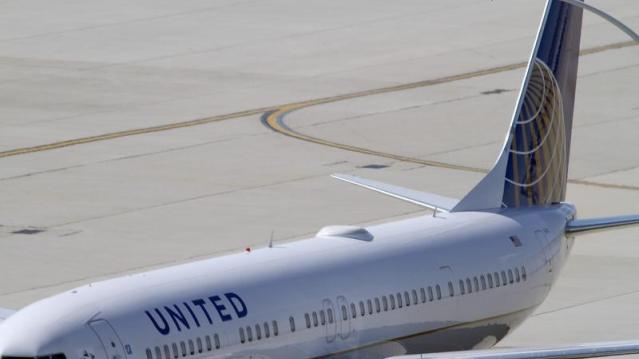Hackers’ Delight: 1 Million Miles for Reporting United Airlines Security Flaws

Now here’s a rewards program Julian Assange could love. United Airlines has confirmed that it paid 1 million frequent flier miles each to two hackers who found serious flaws and security breaches in its computer systems.
Related: Millions of Samsung Galaxy Phones May Be Vulnerable to Hackers
This past May, United started a “bug bounty” program to find loopholes in its security, but it’s hardly the first corporate entity to do so. Google, Facebook and Yahoo all offer rewards or incentives to hackers who report bugs to them privately. Netscape engineer Jarrett Ridlinghafer is largely credited with coming up with the concept of rewarding good, or “white hat,” hackers for trouble-shooting in 1995.
Jordan Wiens, founder of cybersecurity company Vector 35, was one of two winners to claim a million airline miles for his prize. He posted a screenshot of his mileage account on Twitter. (He submitted the bug on May 15, got a response on May 19, a validation notice on June 24 and then the payout on July 10.) A second bug he reported won a lesser prize of 250,000 miles. Kyle Lovett from Montgomery, Calif., was the other million-mile winner. Lovett Tweeted that he will use some of the miles to fly out his mother and brother to California.
Wow! @united really paid out! Got a million miles for my bug bounty submissions! Very cool. pic.twitter.com/CEclmhmyUq
— Jordan Wiens (@psifertex) July 10, 2015
No doubt the airline saved a ton of money in preventing computer issues. In recent months United has had to ground it flights twice as a result of computer system glitches. On June 2, an automation issue affected 150 flights, or 8 percent of its morning schedule. On July 8, a network connectivity issue due to a router malfunction locked up its reservations system and grounded thousands of flights worldwide.
Looks like the airline has more miles to dole out, too: Twitter was full of happy pronouncement from hackers claiming smaller prizes and begging Delta to do the same.
4.2 Million Uninsured People Could Get Free Obamacare Plans

About 4.2 million uninsured people could sign up for a bronze-level Obamacare health plan and pay nothing for it after tax credits are applied, the Kaiser Family Foundation said Tuesday. That means that 27 percent of the country’s 15.9 million uninsured people could get covered for free. The chart below breaks down the eligible population by state.
Takedown of the Day: Ezra Klein on Paul Ryan's Legacy of Debt

Vox’s Ezra Klein says that retiring House Speaker Paul Ryan’s legacy can be summed up in one number: $343 billion. “That’s the increase between the deficit for fiscal year 2015 and fiscal year 2018— that is, the difference between the fiscal year before Ryan became speaker of the House and the fiscal year in which he retired.”
Klein writes that Ryan’s choices while in office — especially the 2017 tax cuts and the $1.3 trillion spending bill he helped pass and the expansion of the earned income tax credit he talked up but never acted on — should be what define his legacy:
“[N]ow, as Ryan prepares to leave Congress, it is clear that his critics were correct and a credulous Washington press corps — including me — that took him at his word was wrong. In the trillions of long-term debt he racked up as speaker, in the anti-poverty proposals he promised but never passed, and in the many lies he told to sell unpopular policies, Ryan proved as much a practitioner of post-truth politics as Donald Trump. …
“Ultimately, Ryan put himself forward as a test of a simple, but important, proposition: Is fiscal responsibility something Republicans believe in or something they simply weaponize against Democrats to win back power so they can pass tax cuts and defense spending? Over the past three years, he provided a clear answer. That is his legacy, and it will haunt his successors.”
Number of the Day: $300 Million

Mick Mulvaney, the acting director of the Consumer Financial Protection Bureau, wants the agency to be known as the Bureau of Consumer Financial Protection, the name under which it was established by Title X of the 2010 Dodd-Frank Wall Street reform law. Mulvaney even had new signage put up in the lobby of the bureau. But the rebranding could cost the banks and other financial businesses regulated by the bureau more than $300 million, according to an internal agency analysis reported by The Hill’s Sylvan Lane. The costs would arise from having to update internal databases, regulatory filings and disclosure forms with the new name. The rebranding would cost the agency itself between $9 million and $19 million, the analysis estimated. Lane adds that it’s not clear whether Kathy Kraninger, President Trump’s nominee to serve as the bureau’s full-time director, would follow through on Mulvaney’s name change once she is confirmed by the Senate.
Why Trump's Tariffs Are Just a Drop in the Bucket

President Trump said this week that tariff increases by his administration are producing "billions of dollars" in revenues, thereby improving the country’s fiscal situation. But CNBC’s John Schoen points out that while tariff revenues are indeed higher by several billion dollars this year, the total revenue is a drop in the bucket compared to the sheer size of government outlays and receipts – and the growing annual deficit.
Bank Profits Hit New Record Thanks to 2017 Tax Law

Bank profits reached a record $62 billion in the third quarter, up $14 billion, or 29.3 percent, from the same period last year, according to data from the Federal Deposit Insurance Corporation. The FDIC said that about half of the increase in net income was attributable to last year’s tax cuts. The FDIC estimated that, with the effective tax rates from before the new law, bank profits for the quarter would have risen by about 14 percent, to $54.6 billion.



